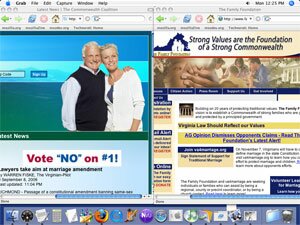NEWS- Words' worth: Marriage amendment debate rages
Rhetorical brush fires are burning everywhere over Republican Senator George Allen's "Let's give a welcome to Macaca here," and his Democratic opponent Jim Webb's "The Naval Academy is a horny woman's dream."
The last time the electorate paid this much attention to politicians' word choice, people were arguing over the definition of the word "is."
And while they haven't received as much attention, the words that might ultimately have the most effect on Virginians this year aren't the utterances of politicians. The most far-reaching words might be those that people will read in the voting booth on November 7: Ballot Question Number 1 to amend the Constitution of Virginia to read, in part, as follows:
"That only a union between one man and one woman may be a marriage valid in or recognized by this Commonwealth and its political subdivisions."
But, as many opponents of the amendment point out, the language doesn't end there.
"This Commonwealth and its political subdivisions shall not create or recognize a legal status for relationships of unmarried individuals," it continues, "that intends to approximate the design, qualities, significance, or effects of marriage."
It's that second paragraph that has many Virginians concerned. Opponents say that alone is reason enough to vote against the amendment.
"This is not about gay marriage," says Claire Guthrie Gastanaga, campaign manager for the Commonwealth Coalition, the group leading the "Vote no" campaign. "This would be a prohibition on partnership agreements between unmarried individuals. That's a significant change in the law. The statute says 'same sex couple'; the amendment says 'unmarried individuals.'"
For Del. David Toscano (D-Charlottesville), that means the amendment will have unintended consequences in aspects of civic life where domestic law is concerned, which he says led to his General Assembly vote against putting the amendment on the ballot.
"Let's say you're trying to dispose of your property by will and you give it to somebody who is not related to you," says Toscano. "Who's to say that another family member won't try to attack that document as unconstitutional because it's bestowing privileges analogous to marriage?"
Gastanaga provides another example that's even closer to home.
"Anyone who's thinking about coming to work at UVA, who's in an unmarried committed relationship, has to think hard about this," she says. "UVA would be permanently prohibited from granting domestic partner privileges like insurance. It would create a class of citizens entitled to fewer rights."
According to Victoria Cobb, Executive Director of the Family Foundation and a leading backer of the amendment, this sort of speculation is unfounded. She says that the purpose of the sentence about unmarried individuals is to close any legal loopholes that "activist judges" may hope to find.
"In Vermont, it's called a civil union. In California, it's called a domestic partnership. We don't know what it's going to be called in the future, so that's why the amendment says 'unmarried individuals,'" Cobb explains.
She adds that the opposition's claim about the broad application of the term "unmarried individuals" is exaggerated, and she cites the ballot itself as proof.
"The General Assembly, the State Board of Elections, and the Attorney General have all rejected the claim that this affects individuals and their ability to create wills and contracts," she says. "It says so in the explanation that voters will see on the ballot."
Indeed, the explanation does specifically state that naming someone to make end-of-life decisions, protections under domestic violence laws, joint ownership of real property, and wills are unaffected by the amendment.
But will judges interpreting the amendment see it that way? Professor A.E. Dick Howard, a constitutional law expert at the UVA Law School, isn't so sure.
"I don't find much comfort in that argument, myself," he says. "It's going to be difficult for judges to read the constitutional language, and it's an even greater reach to believe that judges will be beholden to ballot language."
Attorney General Bob McDonnell is more sure of the amendment's limits. "The intent of the amendment is clear," he wrote in a September 14 statement. "The Marriage Amendment will not affect current legal rights and obligations of unmarried persons." He added, "This opinion is based on our legal analysis of the proposed amendment read together with the current law."
For Gastanaga, this debate within the legal community represents why the amendment should not pass.
"We have dueling memos from respected members on both sides of the legal community," she says. "If you have a contract, and two attorneys you respect, and what they're telling you a contract means is 180 degrees different, would you sign the contract?"
"This is something supported by Virginians, supported by a bipartisan supermajority of the General Assembly," counters Cobb. "Should it be vulnerable to one judge's actions?"
With some polls showing the pro-amendment position with a double-digit lead to others showing the vote a statistical dead heat, there's only one thing for sure. Whether it's "macaca" or "is," words have power.
And just how powerful the words of the marriage amendment will become in the Commonwealth won't be known until all the votes are counted.

The campaign both for and against the marriage amendment has taken to the Internet through groups like the Commonwealth Coalition and the Family Foundation.COURTESY OF THE COMMONWEALTH COALITION AND THE FAMILY FOUNDATION
#